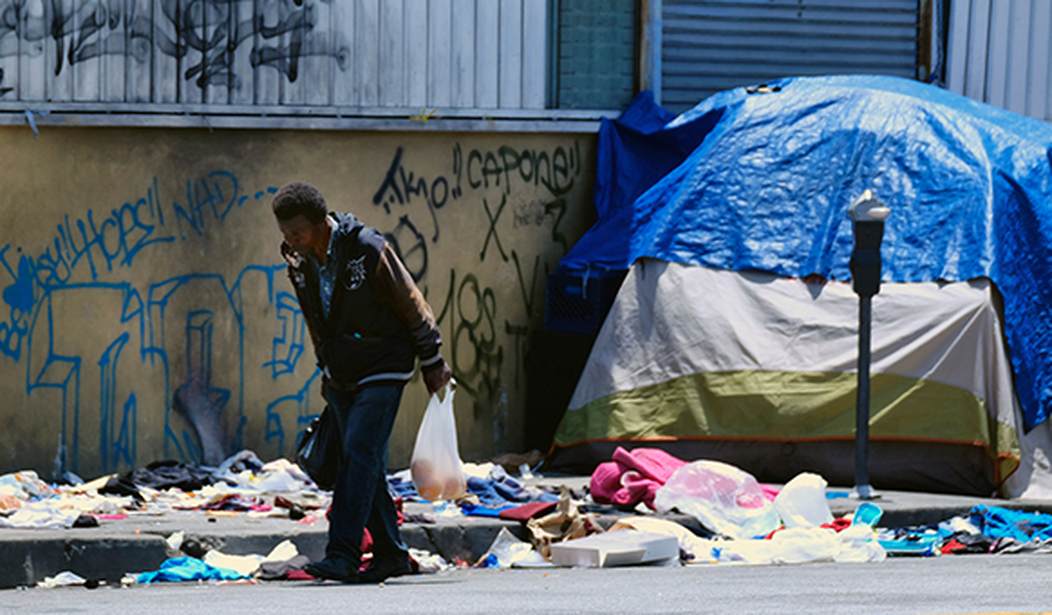I’m not familiar with the author of this piece. Ned Resnikoff is the “policy manager for the Benioff Homelessness and Housing Initiative at the University of California, San Francisco.” Today he has an opinion piece in the NY Times which argues along the typical lines you hear from activists, i.e. homelessness is about lack of affordable housing. He mentions drug abuse and mental heath once but only to dismiss them as significant factors.
It should never have gotten this bad. Homelessness is solvable. Its primary driver is housing unaffordability (not a sudden recent increase in mental illness or substance use disorder, despite claims to the contrary), and so the solution has always been more housing, particularly for those who don’t currently have it. But California has allowed homelessness to metastasize over the past few decades. As the humanitarian crisis has gotten worse, it has become a political crisis. Homelessness is one of the major themes in this year’s campaign to recall Gov. Gavin Newsom, and a growing number of commentators have cited it as evidence that the “California dream” is dying.
I’ve been through all of this before. Activists routinely argue that the majority of homeless are people down on their luck who just couldn’t make rent for one reason or another. To some extent that’s true. Most people who are homeless are only homeless for a relatively short period of time. They move in with a friend or relative and sleep on a couch or in their car until they get another job and a new place to live. Most people cycle in and out of homelessness and never resort to pitching a tent on a sidewalk.
Then there are the chronic homeless that you encounter on the street, often people who’ve been on the street for more than a year or two. Here again, you can find all sorts of official data showing that only about 1/3 of these folks have drug/alcohol/mental health problems. This is often presented by homeless activists to push the point that drugs and mental health aren’t driving the problem.
But there’s reason to be skeptical of that data. Back in 2019, the LA Times did it’s own analysis of the data on homeless people in LA County. The data given to the county by the Los Angeles Homeless Services Authority showed the usual 1/3 of homeless people on the streets had drug/mental problems. But when the Times did it’s own analysis they found something very different:
The Los Angeles Homeless Services Authority, which conducts the annual count, narrowly interpreted the data to produce much lower numbers. In its presentation of the results to elected officials earlier this year, the agency said only 29% of the homeless population had either a mental illness or substance abuse disorder and, therefore, 71% “did not have a serious mental illness and/or report substance use disorder.”
The Times, however, found that about 67% had either a mental illness or a substance abuse disorder. Individually, substance abuse affects 46% of those living on the streets — more than three times the rate previously reported — and mental illness, including post-traumatic stress disorder, affects 51% of those living on the streets, according to the analysis…
The findings lend statistical support to the public’s frequent association of mental illness, physical disabilities and substance abuse with homelessness.
The Times even pointed out that these numbers contradict the claims often made by activists.
Advocates for homeless people tend to not focus their messaging on mental illness, disabilities or substance abuse out of concern that doing so unfairly stereotypes and stigmatizes those without a home.
Briefing The Times on this year’s homeless point-in-time count prior to its release, Peter Lynn, executive director of the homeless authority, defended the agency’s statistics on homeless people with disabilities and substance abuse issues. He attributed the idea that the numbers should be higher to perception bias.
Like other local and state officials, he has portrayed the homeless population as being much like the wider population of housed Angelenos.
The author of the Times Opinion piece goes on to argue that the real danger is that California’s failure to address this problem could be very bad for Democrats:
Even as the homelessness crisis has grown out of the same factors as the crisis of democracy, it has directly contributed to democratic decay. California’s continual failure to make inroads against widespread homelessness risks fomenting anger, cynicism and disaffection with the state’s political system. A state that appears powerless to address fundamental problems does not make a very persuasive case for its own survival. As such, state and local policymakers need to take homelessness seriously as not only a humanitarian disaster, but a threat to liberal democracy.
He’s probably right about that but it’s not necessarily a crisis to have the people who are failing to deal with the problem thrown out of office. In fact, that’s how democracy is supposed to work.
In any case, people were quick to point out in the comments on this article that there’s more to this issue than building more homes and changing zoning laws. Someone from Oakland writes:
Housing affordability is a huge factor for 1 segment of the homeless population; those with jobs/families living discreetly out of cars, RVs, garages or overcrowded in a bedroom or on the couch of a relative. The homeless, however, are a diverse group. The people we tend to identify as homeless are the mentally ill drug addicts. Housing affordability is not the main issue for them. We are burying our head in the sand if we think hard-core drug addicts (who have used to the point of destroying their bodies and minds) simply need housing and everything will be fine. We are also burying our heads in the sand if we think hard-core drug addicted homeless people will voluntarily seek out care. We need conservatorship laws and forced treatment for their health and safety and for the health and safety of everyone else. My brother was a drug addict and we begged the courts to force treatment to no avail. He had a place to stay (with our dad), but he died on the streets. His drug addiction was far stronger than any desire to sleep on a bed in a house. I live next to an encampment of people in Oakland that look like my brother. They are filthy, trash everywhere, open fires. They are so far gone that they can’t think logically about moving to a shelter. Their only thoughts and actions involve getting drugs that their bodies desperately crave. It is not humane to give people who are incapable of taking care of themselves the “freedom” to live in their own excrement.
Another comment with over 500 upvotes:
After living around the unhoused for years here’s what I’ve been able to discern.
1. There’s a lot of people that need medication and help.
2. There’s a large portion of young men and women that are homeless by choice, it’s a lifestyle. Why is this being rewarded?
3. Certain cities are enabling this.
4. No it’s not not just high rents. It wouldn’t matter if the rent was $50 or $500 a month, they aren’t capable or of a sound mind to pay.
5. There’s little concern for law abiding people that want to live in peace and not have folks using the sidewalks as a restroom or yelling at them walking down the street.
Someone from SoCal writes:
Our experience with the homeless is quite different. First, there is barely any enforcement of private property rights, nor public camping statutes. Around Newport, the homeless can let their dogs run free while residents are given citations, they are free to litter wherever, and their tents block beach access. So one can argue homelessness is de facto encouraged. Second, mandatory treatment for mental health issues is basically prohibited by the state, and many of the homeless are unwilling to be treated. Third, and perhaps most importantly, many if not most of these folks do not have the resources (they aren’t working) to support themselves anywhere, regardless of affordability. Homelessness is not a threat to democracy, the breakdown of civil order is the threat.
This one was anonymous:
Anyone that’s living near encampments knows this narrative is false.
It’s still possible that housing first is the best, maybe the only, option we have for dealing with this problem long term. But a lot of the chronic homeless will still need counseling for the mental health and substance abuse problems that put them on the street in the first place. Minimizing those factors in the discussion and pretending that building more apartments will solve the problem isn’t helpful.








Join the conversation as a VIP Member